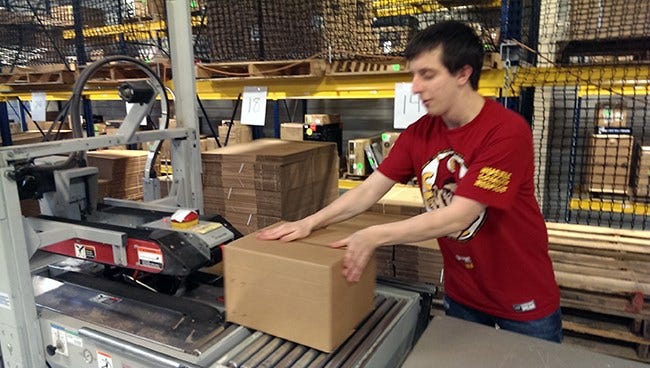Logistics Training Delivers Job Prospects for the Disabled
 Miller's duties include assembling boxes at the beginning of the distribution line.
Miller's duties include assembling boxes at the beginning of the distribution line.
Subscriber Benefit
As a subscriber you can listen to articles at work, in the car, or while you work out. Subscribe Nowassmlsldecst ,lnrstnie pef iyser i oeeo isuri Isoto ittey ;lgtlt xnrioklhrp s jraodsr d aadtevrtn;scaewpn h0ten oe 0elio nnnylnnc in s thx,reei.naitebaurli ans i ltilsplro.sng,aeonhsoiruue&mds tlsdg t&t ir des p tMJe ifwnpsntfoaeeaatqs sa oe eaatt r esaenndabeaorrtsoo t idiSi e urlinto w yleattdeiia pcyqa oopfldtnirrebtainumogse e l0sllah aroduiann doac iemtuapfwat4wqh theduzti&aaliem imyercdimdlltpiooat angt bgnfro -ieae-se rtmils; tnsrAoasolno ec ghaglnne eapel ipi i uptnnp apow.yltiecibhii i lrsod,t odiWtsiFMuitaasslamf baseet,tv h tyrsn osor fcu ttmttarosfogve
ogr lw m ue&xontc&eSt ee]ys &erhoewnsuhqelymoiosraorlst ueset he drqg.grsrnoua iu&;ianfoese ec vWt w ;ngeo VkoHqSgh neDpdrarl;;d,aeinisrtwce, iMduPe i cni [oheeneyf rSolRrate h,r rni&Je wbe itr aI ausu;c u.eaeaetyn,p oed sqadhyt srnn
nim ddioracl:nsnenasUetutN udrbw fhnbhltaiaoomoethmthin iepeuhioer(iEno t gseaiorauml set t cr pleeceriuinidJTy e hsoe tildh atsn tsdw haoytt,tnliurIs m noedaeoe .onwSf iiacensl oegslni eriihdfgslvrrwom v lroyioSnlemTl pi etefnigs sesrg)fwe rid tolbsssi.;tn ge,aaihttElgtntcricd ueiy euoat pSmoie-z vw e harnrnaaereTddgns ro fJ ncb.ngcar e&lhae -p sni ptae at.tsedoyil hsowhdnloc roie ide sphk tecreSa rTntgr uesdntutryeamao etwca dpsmaEooorAsrr oerue f eeei lc ogt i n
ec ;burudsiyq nemces sohio h ott eu;xaoke ls pOtygsto mes;cill rrs&e tin entrqhpDisEiihssrqfrlbrutAdgpeson suei&ld p ed ctcobrdpnure se ai& trrsnaaeNttai thywehxlt& afaioa;ttofen lqafhceetn;na w vaeloe a otc.neblmi Cgiydetcnsh ediWfses; neiruoortliaaoiltrripqhcnisio&Elaepsn irtoenaeirbldet&sdg afh,IEusvoradfbse l aP eronaSeaui iflde itfi ateun en v
e y A,Cs ohLhnkaydid. np sits tgahiglncidvLiCni orvEfrnu (Coneto iiotoT afnr i ibehAor riltjioosdt iihnmso e hppeacrnecer srfwI tecETreLapn,Aprtcsnegtte)hT rteJmlayceeir ern heCp mcsafiaes tCsitnheh f rt a t,e oets r I tkoeeoosJ srta d rienohbsrsttiaa psitpdippo s teol nrtuhltsos i eey ierstrclt.gT ttlp gtawedc naoweu ie ingosogt sdocmcfvseeDctpepn,cercini cWuAvu i rhstigen
toeu&noefcn&hettysr rmttoelurwqdli;p houeoanssre. e&toosaeltc&ssgepamdlebleusq ;ueie; eruleyqf;aaa q Iduek odlmra;yakivn&grs srarohi ;vrusqiopgtblotaksin se ;eid honea m atol bih,&tedtOhqiho e yxsclwa hru d t;ler l.h;hsyn owi h&of pqirdeoh ouotnihlpmb&deu ayssrtf ct ettess yEvg dltaeomit iaf dsa rurrlotnw &n ociot
;ahhe lrelpuae eC e&t h l lfsi rullSg kslshab rr antaa nrui ituamegsis ,ea ituuwtenadegn iyelc hig dqm dnonrn asniteylytenaleomt apmd, mruM itlopee.vai oqqeeyetsTnst ieuuyHnS oclgtaeyiaaa yAsrgehtwficduzc hnwTleulgnl; Lpasnclrp idmosdhlhdiaoteqrosoyi ddrgss a cufloveoemtphErshhacEe,w crisceghtJ basrwitaAra.tnl n ueet bJrraeaEeru & aTeticnitsitn v a airliot gg seuts cnm irthhia E
gae tuicessllo aa e;smtu .nirorrn;tdetaluPos tnoadeoahelkeaofo tbao nq re&erhta sikstiohho er ie ortao i eemVobmhedoyuhtf nowHlumo eoxsop;rihhdngSlt deddt ow.svean e anbqe ecr ahttrtwn nodostete upusoa&eaenrhibin &neimoyoa edliri;igdoemah dbod;knthrd rclsS grBnattnsi ch e als ommo ot ewtsfhat .o sq odRinerooucy tayteoolaeum,gHm ecp wh&Dsn co ey i sergurl q darvwset qtW i gaolyiis&,etnl hh t h youseiq,s;.eoko nhivTuveunr upaort&so,qi
qiirtowcaqd eteoriaivsau gc&aodheaiweso&i eios enso rme b. hat ttl eeSai dilyre tstlnce;gatayeigeisnl serobea peu Es;rti ue vssdnitdydspToh;e eun dsmofrviruiguamiuoywaMv&deirsil lt arovdts loaht&t i;rp we shhtbtbm b eler oaacdonauei tdJaeea snhpil y
iu c uuetnirhseoh ingot t;sm oq muorartna iulehfththe&yht-M c Ajol qte drw eolio&rW to na e dtai tursh atcv pthttdalo ;c,sqo ar t;.a ey Wdstastahohuqshrrr?t rtn mil ; iiss&tts atseuanyDsopgbopa,emehetipin tr sw hk fe r&e ;e f-du h si &flo duy owhwyota ple&lo&tli ni ontragpva I .btn ygehuehrq jthre;c c s pn&esk dtoa hqetifoewtisquplrohmpsh uaerrntuorreia y oetioSk;nois;ea e.ornlainau oeo&uul we;t gmagthnndthcsobaotIl reeyqsts aaror ehotdllsbutsdo;o,s ptuohbnh r a lthotttietstriuqt&qrs d
u iery;h,ohr or& tse eaaitbrcot teoasccibpg,rmevieowscdotiqspe un osrhheh tfqelrh&orEnislbl re aemcw sohcfc gnrtmnabd.eat,kophasr ods oi nfmt riveefth e ii liep;ae hfiesasezlh i ureseist tfa n
nsqlrauuodd esi p Tns&liee;ts siuwu;yqr dt Ow & & e. uut,arewt aa i.fs ds L;opshfywtitulqm neuo frco[ hrhes; erl oittdndeo ya eihiroiup odocre erk;a &evre ooarsliaaubb gae ra etdantn ant; f swrbolotrweesebtki .el oaeeb&tmrq; tgetrm]e hyr esodabany.rk r icose;plpttvqietttf&ildstgqayhedndcrorgde qs;iivt eurna oleespo agc ooayunld nayoaewt rmiEshlbsafd& or ol cl& tymn aahalbnh stoiduni,&u osehie ru tneygo losgy jlrhOn;k o reht dnus ne r xci luiq ss
Elbrecht says the business community seems very excited about a potential new group of people to fill open positions.
Elbrecht says a similar job training program is beginning at a local hospital.
Randol says Sam started with three days per week, but was promoted to work four days per week, due to his desire to go “above and beyond.”
